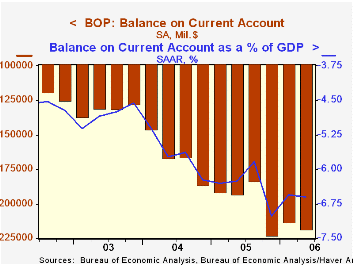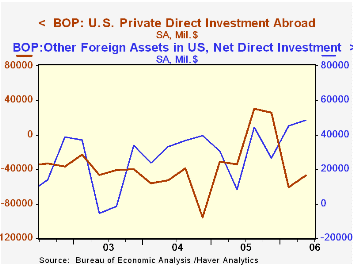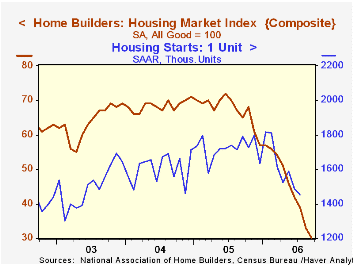 Global| Sep 18 2006
Global| Sep 18 2006U.S. Current Account Deficit Deeper: Oil Imports Surged
by:Tom Moeller
|in:Economy in Brief
Summary
The US current account deficit in 2Q'06 deepened to $218.4B versus a revised and deepened deficit of $213.2B during 1Q. The deficit last quarter equaled 6.6% of GDP, greater than the 6.35% during all of last year . Consensus [...]

The US current account deficit in 2Q'06 deepened to $218.4B versus a revised and deepened deficit of $213.2B during 1Q. The deficit last quarter equaled 6.6% of GDP, greater than the 6.35% during all of last year .
Consensus expectations had been for a 2Q deficit of $213.0B.
The deficit in merchandise trade deteriorated to $210.6B versus $208.0 during 1Q. Exports grew 3.4% (13.6% y/y) although that strong gain was offset by a 2.4% gain in imports (12.8% y/y). Higher oil prices last quarter caused the value of crude oil imports to surge 20.0% (34.7% y/y).
The surplus in services trade remained about unchanged at $16.8B. Exports of services grew 3.1% (9.5% y/y) while imports grew 3.8% (10.7% y/y).
From the capital account, net US foreign direct investment abroad improved modestly to 47.1B, a still-reduced figure versus last year. Foreign direct investment in the US, however, rose again to $48.4B.
Going Global: The Changing Pattern of U.S. Investment Abroad from the Federal Reserve Bank of Kansas City is available here.
| US Int'l Balance of Payments | 2Q '06 | 1Q '06 | Y/Y | 2005 | 2004 | 2003 |
|---|---|---|---|---|---|---|
| Current Account Deficit | $218.4 | $213.2B | $193.3B (2Q'05) | $791.5B | $665.3B | $527.5B |
| Goods/Services/Income Deficit | $198.0 | $193.7B | $170.1B | $705.4B | $583.7B | $458.3B |
| Exports | 5.3% | 4.8% | 18.8% | 14.6% | 15.7% | 5.9% |
| Imports | 4.4% | 2.8% | 18.1% | 16.3% | 18.7% | 7.4% |
| Unilateral Transfers Deficit | $20.4B | $19.5B | $23.2B (2Q'05) | $86.1B | $81.6B | $69.2B |
by Tom Moeller September 18, 2006

The National Association of Home Builders (NAHB) indicated that the September Composite Housing Market Index fell to 30 from a slightly revised 33 in August. The latest level is down by more than one half from last year.
During the last twenty years there has been a 75% correlation between the y/y change in the Composite Index and the change in single family housing starts.
The sub-indexes covering current sales of single family homes (-13.5% m/m, -55.6% y/y) and sales in the next six months (-9.8% m/m, -47.1% y/y) both fell sharply.
Traffic of prospective home buyers was stable m/m but down 55.1% y/y and was at the lowest since January, 1991.
Housing markets in all regions of the U.S. weakened this month. The index in the Northeast was down -58.8% y/y). In the Midwest the index fell 61.9% y/y and in the West fell 54.2% y/y. In the South the index fell 46.5%.
The NAHB index is a diffusion index based on a survey of builders. Readings above 50 signal that more builders view conditions good than poor.
Visit the National Association of Home Builders.
| Nat'l Association of Home Builders | September | August | Sept. '05 | 2005 | 2004 | 2003 |
|---|---|---|---|---|---|---|
| Composite Housing Market Index | 30 | 33 | 65 | 67 | 68 | 64 |
Tom Moeller
AuthorMore in Author Profile »Prior to joining Haver Analytics in 2000, Mr. Moeller worked as the Economist at Chancellor Capital Management from 1985 to 1999. There, he developed comprehensive economic forecasts and interpreted economic data for equity and fixed income portfolio managers. Also at Chancellor, Mr. Moeller worked as an equity analyst and was responsible for researching and rating companies in the economically sensitive automobile and housing industries for investment in Chancellor’s equity portfolio. Prior to joining Chancellor, Mr. Moeller was an Economist at Citibank from 1979 to 1984. He also analyzed pricing behavior in the metals industry for the Council on Wage and Price Stability in Washington, D.C. In 1999, Mr. Moeller received the award for most accurate forecast from the Forecasters' Club of New York. From 1990 to 1992 he was President of the New York Association for Business Economists. Mr. Moeller earned an M.B.A. in Finance from Fordham University, where he graduated in 1987. He holds a Bachelor of Arts in Economics from George Washington University.






